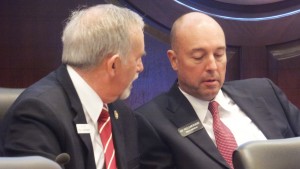
A $27.8 million bill to cut taxes is headed to the House floor — amidst concerns that it could undercut K-12 funding.
In the end, however, House Bill 380 received bipartisan support from the House Revenue and Taxation Committee. Rep. Dan Rudolph, D-Lewiston, joined a dozen committee Republicans in endorsing the bill.
Sponsored by House Majority Leader Mike Moyle, R-Star, HB 380 would reduce Idaho’s top two personal income tax rates from 7.4 percent to 7.3 percent, and from 7.1 percent to 7 percent. The corporate income tax rate would also drop from 7.4 percent to 7.3 percent.
For individuals and families who would not receive a reduction in income taxes, the state’s income tax credit for groceries would increase from $100 per person to $110.

Moyle conceded he would prefer a bigger tax cut, on the order of $100 million. But he said his bill would take another step to bring Idaho’s income tax rates closer in line with neighboring states.
And Moyle predicted that legislators would still approve a K-12 spending increase of about $100 million — less than the $116 million proposed by Gov. Butch Otter and the $110 million sought by state superintendent Sherri Ybarra, but in line with the increase approved a year ago.
“There’s ways to do both,” he said.
Critics said Moyle’s bill would provide only modest tax relief and school districts would still be forced to depend on short-term and unpredictable supplemental property tax levies to boost local budgets.

“(I’m) disappointed in where we’ve placed our priorities,” said Rep. Mat Erpelding, D-Boise.
Ultimately, only Erpelding and Pocatello Democrat Mark Nye voted against the bill, which passed the committee on a 13-2 vote.
The first full hearing on a tax bill drew a varied audience Monday morning. House Speaker Scott Bedke sat in for much of the hearing. So did lobbyists for the Idaho Education Association, the Idaho School Boards Association and the Idaho School Boards Association. Also attending — and testifying — was frequent GOP candidate Harley Brown, who ran for governor in 2014 and briefly entertained running for president in 2016.
The next stop for HB 380 is the House floor. Passage appears all but certain: 26 House Republicans are listed as co-sponsors, and an additional seven lawmakers voted for the bill in committee Monday. The bill needs 36 votes to pass the House.
In other business Monday:
SBAC testing. Superintendent of Public Instruction Sherri Ybarra proposed eliminating SBAC testing at the high school level — eventually.

Appearing before a rare joint session of the House and Senate education committees, Ybarra called for eliminating requirements to administer the ISAT 2.0 by Smarter Balanced Assessment Consortium test (more commonly referred to as the SBAC) to ninth- through 12th-graders. She did not address SBAC testing requirements in grades three through eight.
Ybarra also called for moving away from state-sponsored SAT testing and using the ACT as Idaho’s college entrance exam of choice.
SBAC has come under fire in districts from Boise to Madison in recent months, with educators saying the tests are too lengthy and failed to deliver results in a timely manner.
Ybarra emphasized that the SBAC change will not happen overnight and offered lawmakers no specific proposal. She again emphasized that Idaho students will take the SBAC as planned this year.
“Its going to be awhile — it’s certainly not going to be this year and it’s certainly not even going to be next year where we could even address it,” Ybarra told lawmakers.
Idaho’s 60 percent goal. No one seems sure if the state can get there, but the Senate Education Committee reaffirmed support for Idaho’s 60 percent postsecondary education goal.
The nonbinding Senate Concurrent Resolution 134 centers on a longstanding State Board of Education goal: boosting postsecondary completion rate to 60 percent by 2020. In 2014, only 40 percent of Idaho’s 25- to 34-year-olds held a postsecondary degree — and the number has actually dropped from 42 percent in 2012.
Lt. Gov. Brad Little presented the resolution and called the 60 percent goal attainable. But he tempered his enthusiasm, and said he’d be “reluctant” to bet the ranch on hitting the 2020 target.
Other speakers tried to shift the focus away from the 2020 deadline — focusing instead on the needs of the work force. In the future, 60 to 70 percent of Idaho jobs will require a postsecondary education. Rod Gramer, CEO of Idaho Business for Education, reminded lawmakers of the message they’d heard in October from Jeff Sayer, the former head of Idaho’s Department of Commerce. Sayer urged legislators to invest in education and work force development, and set aside talk of tax cuts.
SCR 134 now heads to the Senate floor.
A message on alternative high schools. Idaho’s 2015 teacher of the year came to the House and Senate education committees with a simple message: Don’t blame alternative high schools for Idaho’s graduation rate struggles.

Instead, alternative schools boost the state’s graduation rates, by helping students who have struggled in conventional high schools, said Kim Zeydel, a teacher at Meridian Academy, an alternative high school in the West Ada School District.
State Board President Don Soltman lamented Idaho’s lagging graduation rates last week in a presentation to legislative budget-writers — singling out low numbers for alternative and virtual charter high schools. Alternative high schools had a 36 percent graduation rate in 2013-14; online charter schools had a 20 percent rate.
Idaho’s overall graduation rate was 77.3 percent, ranking No. 41 nationally.
Career technical education. The Senate endorsed a bill to rename the state’s Division of Professional Technical Education the Division of Career Technical Education.
Senate Bill 1210 passed 32-1, with only Senate President Pro Tem Brent Hill, R-Rexburg, voting no.
The 38-page bill would delete numerous references to professional technical education from Idaho code. The name change carries an estimated $3,100 price tag, needed to change signs, letterheads and business cards in the division.
Idaho Education News reporter Clark Corbin contributed to this report.
